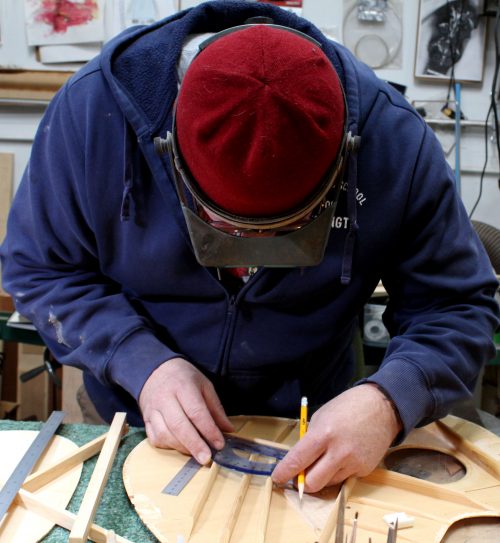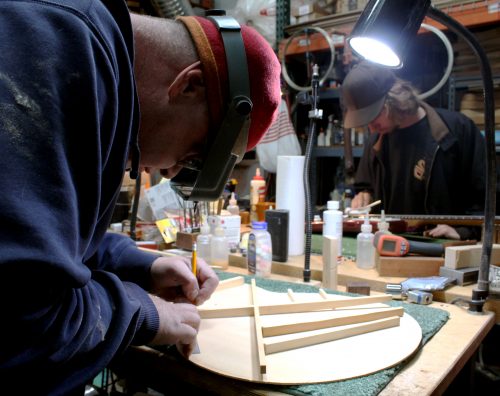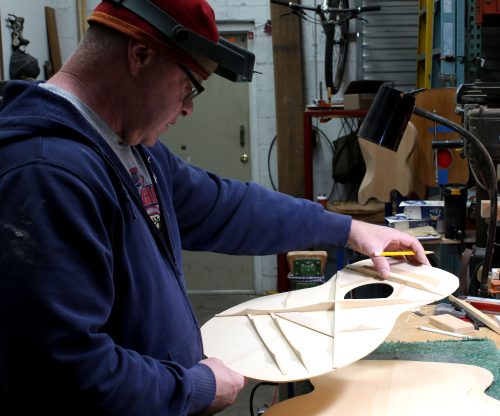By Jake O’Rourke/El Inde
A balmy Tucson breeze made its way through the open door of Gordon Groves’ southside workshop. He was in a sharp trance using a white-tipped pencil to trace abalone stone inlays. He will put the inlays into the ebony fretboard of a 12-fret dreadnought, a style of acoustic guitar featuring a larger body shape to create louder, richer tones compared to smaller-sized guitar bodies.
Hunched over the guitar, pencil in hand, he looks like a surgeon with a scalpel over an open body in the operating room.

Photo by Jake O’Rourke.
I’ve been waiting for him to reach a stopping point so I can say hello. The bells strung across the top of the door jamb dimly chime, breaking up the silence he has been working in since before my arrival.
He places the pencil on his bench and tilts his gaze in my direction. He’s wearing a headband magnifier which makes his eyes pop like a surprised cartoon character. He wipes the sweat off his forehead with his forearm and straightens his posture as he pulls the headband magnifier over his buzzed head and welcomes me to his space in front of the guitar.
Groves stands at a proud six-foot-three, seemingly as wide as the door frame to his shop. With sleeve tattoos consisting mostly of Japanese traditional work like koi fish and water, his perceived strength is matched by his Arizona record for powerlifting in his age group a few years back. During his last workout, the 58 year old deadlifted 405 pounds for two reps and has his sights set on clearing 500 pounds as he trains for a competition next year. He loves Joseph Conrad, Marcus Aurelius, Black Sabbath, and Richard Wagner.
The guitar he’s working on has a body made of flawlessly symmetrical cuts of Brazilian rosewood—listed as a threatened species in 1992 and is no longer allowed to be harvested or exported for commercial use—and an Adirondack spruce top. This particular guitar is the perfect example of the work Groves has prided himself on during his 32 years as a luthier.
One of over a hundred guitars Groves has built, this one is merely days from completion. Up to this point, he’s invested more than a month fabricating and agonizing over every inch of this completely custom “soul tool,” as Groves refers to them.
“I’m an artisan, and I make this beautiful tool. I do the best I can so that this tool works exactly the way that the player [wants]. You’re not driving the tow truck around the racecourse anymore; now you’re driving the Ferrari. I want to get the Ferrari into your hands so that you can get your best lap time.”
He wants all his guitars to be the “holy cow” guitar. “That’s not what I really call it, but I’ll keep it family friendly,” Groves said.
When a guitar is factory made, pieces of wood are machine cut to precise measurements so it can be produced at large scale. When Groves makes a custom guitar, he builds it specifically to the type of music that will be played on it and how it is going to be played. With every piece hand selected from his archive of materials he has accumulated for over 30 years, and with every inch of the guitar curated to the player’s style, the final product is as unique as one’s own fingerprints.
Originally from Newark, New Jersey, Groves moved to Phoenix and graduated from the Roberto-Venn School of Luthiery in 1990. There, he learned from some of the best in the business while bringing his prior knowledge in woodworking to enhance the practice at the school.
“He actually taught me how to sharpen a [card] scraper because when Gordon came through the school, he had already studied with fine woodworkers,” said John Reuter, mentor to Groves, Director of Training at Roberto-Venn, and a graduate of the school in 1984. “He was one of the kids that knew as much or more about woodworking than I did; I just was better at specifically guitars.”
Groves introduced the card scraper, an old tool used in woodworking for the same purpose as sandpaper, to Roberto-Venn, showing his classmates and instructors a more efficient way to smooth wooden surfaces. If properly cared for, a card scraper will last a career whereas sandpaper wears out and needs to be replaced repeatedly. The school now uses card scrapers in place of sandpaper.
Just as he was mentored by Reuter, Groves now mentors students from Roberto-Venn and has an apprentice in his shop. Cameron Mannor has worked as Groves’ apprentice for a year and a half, and the shy 19 year old helps Groves with various tasks around the shop while learning the intricacies of luthiery.

Photo by Jake O’Rourke.
“I’ve wanted to do this since I was 14,” Mannor said while organizing the various bracings and tools he was using on his side of the bench. “Being introduced to Gordon was one of the better things to happen in my life. I actually got to get some discipline in the thing I was so interested in and actually see it be a real career and way to spend my life…I can’t think of anything I’m more passionate about.”
While Groves has been able to shape his own life and the lives of his mentees physically and mentally for the better, he needed to dramatically rebuild himself in 2011 after his life had unexpectedly taken a turn for the worse.
“We were getting ready to go out to dinner. I was sharpening some chisels in my shop, which, at the time, was behind my house. I told her I would be in in 15 minutes. Then, I came in the house, and I’m doing fucking CPR and calling the paramedics.”
Groves’ wife Juliet had a seizure, and although the paramedics were able to start her heart again and get her on life support, Groves ultimately had to make the most difficult decision of his life: letting go of his wife forever. Shellshocked and unable to function at his previous capacity, Groves eventually found love again in his wife’s former friend Liz.
“She was Johnny on the job,” Groves said. “Liz came around and was making sure I had food in my refrigerator, and next thing you know we have a family together. Just when you think your life’s going one way, it starts going some other way.”
Groves was able to find his lost passion for work, life and happiness. Through it all, he remains a husband, a father, a mentor, a widower, a weightlifter and a metal head while channeling himself into the creation of every “soul tool” that leaves his bench.

Photo by Jake O’Rourke.
“I get the sense that no matter how long I do this, I’m never going to get to the end of the information,” Groves said. “I’m going to be learning stuff until the tools fall out of my hands.”
He now visits Roberto-Venn as a guest instructor and sits on the school’s advisory board. “He’s one of those stand-up guys that’s been out there doing this for a long time, and we value his opinion when it comes to the way we educate our students,” Reuter said. Groves was a drill instructor in the 82nd Airborne and is a “no nonsense” kind of guy, according to Reuter. The school brings Groves in to work with the students and give them a little reality check from time to time with his militaristic teaching style.
During his time in the military after graduating high school, Groves came across a pamphlet that told the story of Genghis Khan’s elite shock troop, the Mangudai; essentially the SEAL Team Six of Genghis Khan’s hordes. As Groves recalls, the Mangudai were known for their ability to fearlessly vanquish any contenders. “They would take their helmets off before they went into battle so they could be closer to death,” Groves said. “They were there for a spiritual experience.”
During a battle in which the Mangudai found themselves trapped by enemy forces, instead of taking the boats they had constructed and fleeing, the leader of the shock troop burned all the boats, leaving the Mangudai no choice but to stay and fight. Through this questionable burning of the boats, the Mangudai were able to overcome and vanquish their enemy once more.
“When I chose this career, I was like ‘I’m all in.’” Groves said. “In the ‘90s, tattooing wasn’t as acceptable as it is now, so I wanted to get sleeved out so that I’m ruined for straight work. I’m never going to be a bank manager. I wanted to make myself unqualified for these other jobs…I’ve burned my boats, and now I’m all in for guitar work.”
